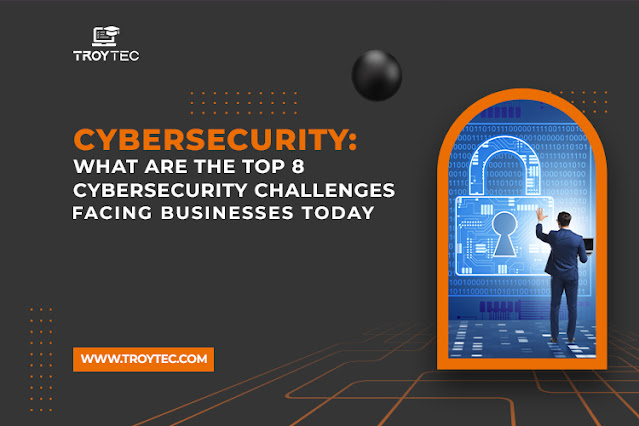Cybersecurity: What Are The Top 8 Cybersecurity Challenges Facing Businesses Today
Cybersecurity: What Are The Top 8 Cybersecurity Challenges Facing Businesses Today
Cybersecurity is a critical issue facing businesses today as the number of cyber threats continues to grow. From small businesses to multinational corporations, all organizations are at risk of being targeted by cybercriminals looking to steal sensitive information, disrupt operations, or extort money.
This blog post will discuss the top 8 cybersecurity challenges businesses face today.
Ransomware
Ransomware is malware that encrypts a company's data and
demands a ransom payment in exchange for the decryption key. This type of
attack has become increasingly common in recent years, and businesses of all
sizes are vulnerable. Ransomware attacks can devastate a company, resulting in
critical data loss, disruption of operations, and ransom payments.
Phishing Scams
Phishing scams are another common threat facing businesses
today. These attacks use fake emails or websites to trick employees into
revealing sensitive information, such as usernames and passwords. The
information gathered in a phishing scam can be used to steal sensitive data or
install malware on a company's network.
Insider Threats
Insider threats are a growing concern for businesses, as
employees can access sensitive information and the tools to compromise a
company's security. Whether it is intentional or accidental, an employee can
cause significant damage by leaking sensitive information or accessing
restricted data.
Unsecured Internet of Things (IoT) Devices
The Internet of Things (IoT) refers to devices connected to
the internet and controlled remotely. These devices are becoming increasingly
common in businesses and can pose a significant security risk if they are not
properly secured. An unsecured IoT device can be hacked, allowing
cybercriminals to access a company's network.
Malware
Malware refers to software that is designed to harm a
computer system. This software can steal sensitive information, install other
malware, or disrupt operations. Malware can be delivered to a company through
infected email attachments, malicious websites, or unsecured IoT devices.
DDoS Attacks
A DDoS (Distributed Denial of Service) attack is designed to
disrupt a company's operations by overwhelming its servers with traffic. This
type of attack can cause significant damage to a company's reputation, and it
cannot be easy to recover from.
Unpatched Software
Software vulnerabilities are a major concern for businesses,
as cybercriminals can exploit them to access a company's network. It is
important for businesses to regularly patch their software to fix these
vulnerabilities and reduce the risk of attack.
Social Engineering
Social engineering is an attack that uses psychological
manipulation to trick individuals into revealing sensitive information. This
attack can steal sensitive data or access a company's network. Social
engineering attacks can take many forms, including phishing scams,
impersonation, and baiting.
Conclusion
Cybersecurity is a critical issue for businesses today, and
the challenges facing organizations are constantly evolving. To protect
themselves against these threats, companies must stay vigilant and adopt best
practices for cybersecurity. This includes implementing strong passwords,
regularly patching software, and training employees to recognize and respond to
cyber threats. By being proactive and taking the necessary steps to protect
their networks and data, businesses can reduce their risk of becoming a victim
of a cyber attack.

.jpg)
.jpg)
.jpg)
Comments
Post a Comment